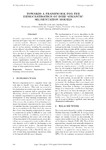Towards a framework for the democratisation of deep semantic segmentation models

View/
Use this link to cite
http://hdl.handle.net/2183/31413
Except where otherwise noted, this item's license is described as Atribución-NoComercial-CompartirIgual 4.0 Internacional (CC BY-NC-SA 4.0)
https://creativecommons.org/licenses/by-nc-sa/4.0/deed.es
Collections
Metadata
Show full item recordTitle
Towards a framework for the democratisation of deep semantic segmentation modelsDate
2022Citation
Escobedo, R., Heras, J. (2022) Towards a framework for the democratisation of deep semantic segmentation models. XLIII Jornadas de Automática: libro de actas, pp.980-984 https://doi.org/10.17979/spudc.9788497498418.0980
Abstract
[Abstract] Semantic segmentation models based on deep learning techniques have been successfully applied in several contexts. However, non-expert users might find challenging the use of those techniques due to several reasons, including the necessity of trying different algorithms implemented in heterogeneous libraries, the configuration of hyperparameters, the lack of support of many state-of-the-art algorithms for training them on custom datasets, or the variety of metrics employed to evaluate semantic segmentation models. In this work, we present the first steps towards the development of a framework that facilitates the construction and usage of deep segmentation models.
Keywords
Semantic segmentation
Deep learning
Democratisation
Deep learning
Democratisation
Editor version
Rights
Atribución-NoComercial-CompartirIgual 4.0 Internacional (CC BY-NC-SA 4.0)
https://creativecommons.org/licenses/by-nc-sa/4.0/deed.es
ISBN
978-84-9749-841-8






